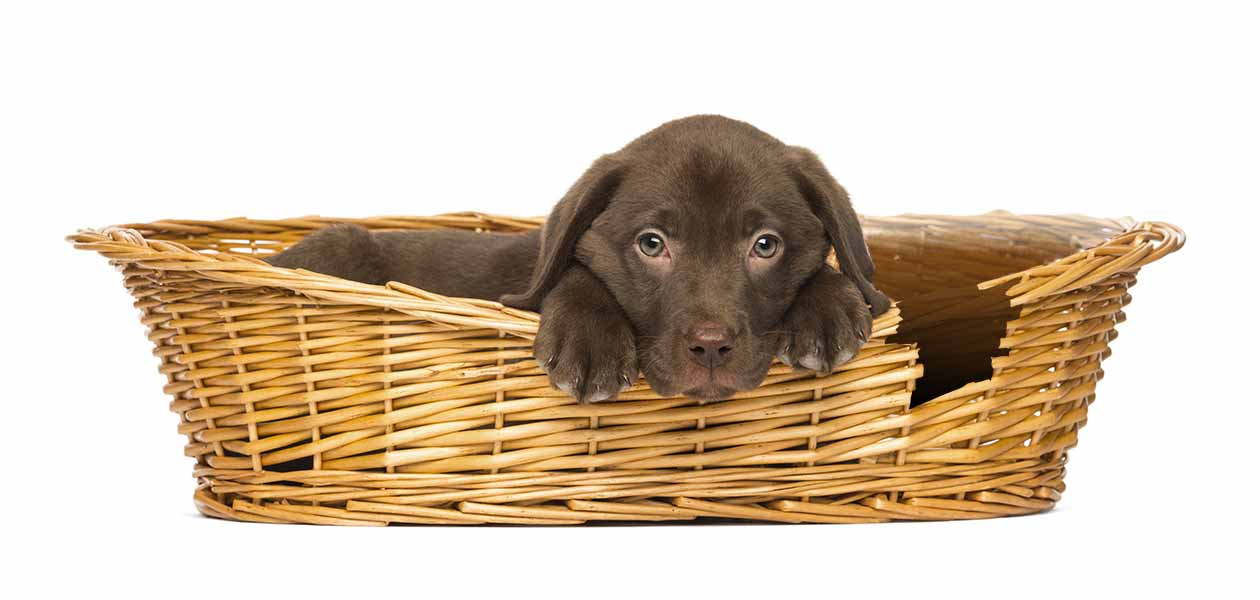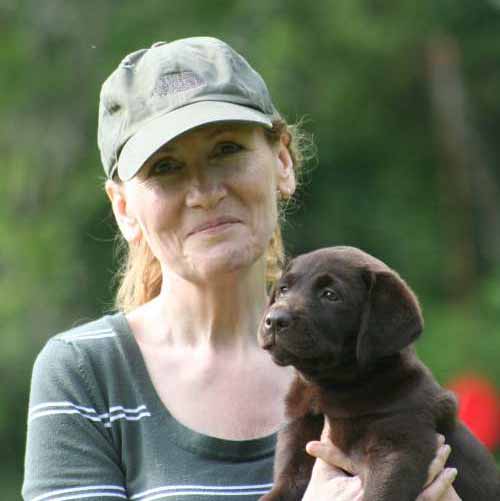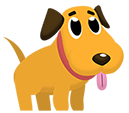
A puppy chewing his bed is just following his natural instincts. But, this behavior can be frustrating and expensive for us as owners.
When you’ve spent good money, and time, picking the perfect cosy place for your pup to lay his head, it’s tough to see them destroy it.
Fortunately there are some things you can do to tackle this destructive habit.
And it starts with identifying the cause of the behavior.
Why Is My Puppy Chewing His Bed?
There are a variety of reasons that puppies chew on their beds. But it’s likely to be one or more of the following:
- Teething
- Relaxation
- Attention
- Fun
- Boredom
- Stress
- Habit
To stop a puppy chewing his bed it helps to try to work out which of these reasons might be at play.
Teething
Until he is seven months old, your puppy will be growing new teeth and losing his old ones.
This process isn’t usually terribly painful, but it can be a bit sore.
And that tender feeling in their gums is relieved by the act of chewing.
The surface they choose to chew will often be rough or bumpy, and the pressure that surface gives will be soothing to your little dog.
Your clothes, hands and basically anything else they can get their jaws around might be a target during this time.
Relaxation
Having their gums soothed is a relaxing sensation. But so is the simple act of chewing.
This is especially true of retrieving breeds. Those that have been selected over the generations to want to pick up and hold things with their mouths.
Fun
Chewing is fun! It’s one of many dogs’ favorite activities, and can remain so even as they grow.
Puppies like to chew certain textures, and they want easy accessibility to them.
If their bed is to hand and they fancy a chew, then that’s what they’ll pick up.
Boredom
You find entertainment where you can get it. If nothing else is around, then your pup will use the only thing to hand.
This will often be your wooden items of furniture, or their own bed.
If your pup is lacking in other entertainment then their bed becomes just another one of the toys.
A way to distract or occupy themselves.
This problem is exacerbated in homes where the puppy’s parents work full time, and they have not set up a good schedule for their care during these hours.
Stress
This is often true if they are feeling a little stressed.
We’ve talked about how chewing can be both fun and relaxing to your dog. Well, this becomes even more relevant if they are stressed.
And being a tiny puppy in a big new world can be worrying and a little stressful.
Puppy Chewing His Bed for Attention
“Gah!” you shout, as you see your puppy picking up their lovely new, pricey bed in their teeth.
It’s intended to make them stop, or just an expression of surprise. But it has the exact opposite impact to the one you’d want.
Especially when you rush over to pick them away from the bed.
Because puppies, like the rest of us, love attention.
Even shrill or squeaky noises that we might think are negative, can be construed positively to a peppy puppy.
Habit
Once your puppy has started chewing, they will soon realise it’s rewarding.
Whether the reward is fun, distraction or relaxation, if it happens more than a couple of times it can quickly become a habit.
And habits can be harder to break, so it’s best to act quickly.
There are a few ways to tackle this problem. But, the bad news is it probably won’t come free of charge.
How to Stop a Puppy Chewing His Bed
There are a few things you can try to stop your puppy chewing their bed, but they all have downsides.
For the most part they come at a cost:
- A bigger range of toys
- Remove their bedding
- Vet bed
- Raised dog bed
- Training
- Time management.
Which option you choose will depend upon your circumstances, and your budget!
A Bigger Range of Toys
Sometimes a puppy will chew things you didn’t intend for them to, because they are looking for a specific outlet.
Their gums need something rougher, smoother, more lumpy or harder than they are being provided by their toys.
If they are chewing their bed then soft but durable dog toys are a good place to start.
The Kong tough toys are firm favorites of ours, and we recommend those without stuffing for persistent chewers.
You might find rope toys help if your puppy is chewing the edging on their bed.
Tighten Up Their Bed
If you have seen your puppy chewing his bed once or twice, then you can prevent him from doing so again by making access difficult.
This only really works if his current soft bed is in a hard to chew outer layer.
Soft Beds vs Hard Beds
Puppy owners tend to have three different types of beds.
- Soft
- Hard
- Crate
A soft bed is one that’s basically a glorified pillow. A hard bed is one that has a hard outer structure, usually made or plastic or wicker. It’ll have a soft lining lining in a hard bed.
A crate works the same way, with a soft sleeping layer inside a metal cage structure.
If you have a hard bed frame or a crate, then the soft inner layer can sometimes poke up appealingly at the corners.
If this is the case, tuck those corners and edges in. The inner soft layer should fit snugly into the outer layer.
It’s possible to weigh it down with their toys too, which helps to keep the edges from poking up. This can also provide a good distraction.
Remove Their Bedding
If you have a puppy chewing his bed regularly or habitually, you are going to need to remove it.
Hopefully, this will just be temporary. But it may need a permanent replacement if it’s badly damaged.
Of course, you don’t want your treasured puppy just sleeping on a hard floor or bed without padding!
So you’ll need to invest in an alternative.
Our primary go-to for any chewy puppy is veterinary bedding.
Vet Bed
I am a big fan of this stuff for puppies, and other baby animals.
Veterinary bedding comes in single sheets or a roll.
You can cut it exactly to the size you need, and it’s machine washable.
It’s also not that easy to chew, especially if it’s used in a crate that it fits perfectly.
And if your pup does chew it, it’s relatively inexpensive to replace.
Raised Dog Bed
Another great option is getting an elevated dog bed.
These come with steel frames that even the most keen chewer couldn’t get his teeth into, and a reinforced mesh bed that again most dogs can’t make a dent in. (Although it can be done!)
The bed is tough but still comfortable because its elevation creates a sort of low slung hammock.
Our big bed-chewing Lab loves to relax in her raised dog bed. It’s been the biggest success of any of our pet furniture purchases.
They aren’t cheap, but they last a long time. So, it’s a good investment for those really enthusiastic bed biters.
Time Management
You can stop a puppy chewing his bed by improving your time management.
A lot of puppies chewing can be traced back to boredom, stress or finding their own entertainment.
Because pups require more focus than most new puppy owners expect.
It is possible to raise a puppy while you work full time, but it’s not always easy.
You need to get a tight schedule going for their daily routine, which involves lots of company and plenty of interaction.
Don’t just set a routine for potty breaks. Make sure that your pup is spending plenty of time with the human members of his family.
Both in play and in training.
Training
Puppies thrive with the right environment. And a lot of that comes down to how you spend your time with them, as we’ve just seen.
But one of the biggest influencing factors on your pup’s behavior is training.
Whilst we don’t want to formally train a tiny new puppy not to chew on his bed, we can still influence his actions indirectly through training.
Informal training games like those you find in our Puppy Parenting course don’t just set the foundation for good behavior.
They strengthen the bond between you, and they keep his brain and body busy.
When pups retire to their bed, if they’ve had a busy day they are more likely to go straight down for their nap.
And less likely to destroy their bed while they’re waiting to drift off to sleep.
Is Your Puppy Chewing His Bed?
Let us know in the comments how you’ve been dealing with a puppy chewing his bed.
Have you learnt any tricks to stop him? Or trained any new, good behaviors into your dog?
We would love to hear from you.
Readers Also Liked
- How To Potty Train A Puppy While Working Full Time
- Teaching A Puppy Bite Inhibition
- How To Stop My Puppy Jumping Up And Nipping
- My Puppy Hates Harness Wearing
- Do’s and Don’ts of Puppy Potty Training
- Can Dogs Eat Honeydew Melon?
- What Is A Pedigree Dog?

Free Training Tips
Get Pippa's free dog training tips delivered to your inbox

 How To Stop A Puppy From Chasing the Cat
How To Stop A Puppy From Chasing the Cat
Hopefully you can help me my dog is3 he is wild can’t be around other dogs AND hes also strong pulled me down a few times although I do have a harness for him have tried everything food dog school I think he has high anxiety too besides the fact hes not neutered could this be the problem?
My dog was hard to walk because he would pull me down, I put him in a harness, even that he pulled me, I got this very short leach from pet smart, it only about the three feet, it is doubled along half the leach, my dog can’t get in front to pull me….it worked for me, I don’t walk him much anymore, he has a good size back yard to run around in. When we first got him as a puppy he didn’t know he was a dog, he thought he was just another grandchild running around with the kids, he would get himself tired, why we thought he didn’t know he was a dog, he would put his front paws on the swing and walk back and forth, he would love to run up the slide and then slide down, he would go into the kids play house and put his paws up and look out the window, he would even punch the door closed so the kids would have a hard time opening it, always with his tongue hanging out like he was laughing….